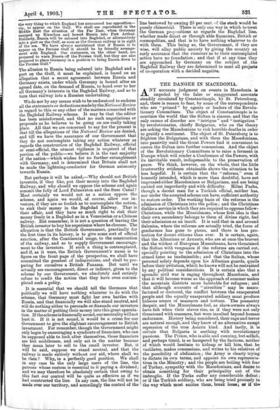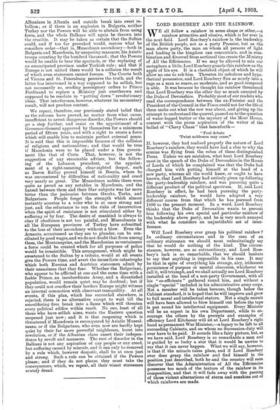• THE DANGER IN MACEDONIA. A NY accurate judgment on events
in Macedonia. is impeded by the false or exaggerated. accounts steadily circulated by Constantinople, by St. Petersburg, and, there is mason to -fear, by some of the correspondents who are " primed " by agents or leaders of the Revolu- tionary Committees. The object of Constantinople is to convince the world that the Sultan is sincere, and that the only causes of disorder are " intrigue " and " instigation " by revolutionaries, chiefly Bulgarian, who on the theory are asking the Macedonians to risk horrible deaths in order to gratify a sentiment. The object of St. Petersburg is to frighten the Bulgarians, and with them the Macedonians, into passivity until the Great Powers find it convenient to coerce the Sultan into further concessions. And the object of the Revolutionary Committees is to raise a ferment in Europe which will render a Conference of the Powers, with its inevitable result, indispensable to the preservation of peace. We think, however, on the whole, that the little trustworthy evidence obtainable shows the situation to be leas hopeful. It is certain that the "reforms," even if honestly intended, which is more than doubtful, have not impressed either Macedonians or Bulgarians, and are being carried'out imperfectly and with difficulty. Hilmi Pasha, though a decent man for a Turkish official, neither has, nor under the accepted scheme can have, sufficient authority to restore order. The working basis of the reforms is the admission of Christians into the police ; and the Christians dislike a service in which they are required to oppress fell-ow- Christians, while the Mussulmans, whose first idea is that their own ascendency belongs to them of divine right, feel their admission as an insult. It is-said that in and around Salonic,a, where the reforms are actually tried, the force of gendarmes has gone to pieces, and there is less pro- tection for decent citizens than ever. It is certain, again, that the Albanians or Arnauts, who are at once the bravest and the wildest of European Mussulmans, have threatened the Sultan with vengeance if the reforms are carried out, specially pointing to the admission of Christians into the armed force as inadmissible ; and. that the Sultan, whose personal safety depends.upon his Albanian guards, quails before their irritation, which he knows will not be restrained by any political considerations. It is certain also- that a sporadic civil war is raging throughout Macedonia„ and that it will become worse as the approach of summer makes the mountain districts more habitable for refugees; and that although accounts of " atrocities " may be manu- factured or doctored, the conflict between the exasperated people and the equally exasperated soldiery must produce hideous scenes of massacre and torture. The peasantry despair, and the Mussulmans feel, as slave-owners always have felt when their slaves rise, as if they were only threatened with massacre, but were insulted beyond human endurance. History being considered, their rage and terror are natural enough, and they know of no alternative except repression of the true Asiatic kind. And lastly, it is certain that Bulgaria is seething with revolutionary passions. The Prince, who is able and cunning, but selfish, and perhaps timid, is so hampered by the factions, neither of which would hesitate to kidnap or kill hitn, that he vacillates, makes concessions, and writes to his relatives of the possibility of abdication ; the Army is clearly trying to dictate its own terms, and appoint its own representa- tives in the Ministry; and the people are boiling with fear of Turkey, sympathy with the Macedonians, and desire to obtain something for their principality out of the imbroglio. If the Turks suffer any considerable .defeat ; or if the Turkish soldiery, who are being tried precisely in I-the way which most excites them, break loose; or if the Albanians in Albania and outside break into overt re- bellion; or if there is an explosion in Bulgaria, neither Turkey nor the Powers will be able to abstain from using force, and the whole Balkans will again be thrown into the crucible. It may be taken as certain that the Sultan could, and if too far provoked would, restore what he considers order—that is, Mussulman ascendency—both in Bulgaria and Macedonia, by unsparing massacre, his Asiatic troops counting by the hundred thousand ; that the Powers would be unable to bear the spectacle, or the replacing of an emancipated province under Turkish rule ; and that if Europe is not united there would be a collision the result of which even statesmen cannot foresee. The Courts both of Vienna and St. Petersburg perceive the truth, and the latter has intervened in a way supposed to be selfish, but not necessarily so, sending peremptory orders to Prince Ferdinand to replace a Ministry just overthrown and supposed to be resolute in "putting down" revolutionary ideas. That interference, however, whatever its momentary result, will not produce content.
We repeat, therefore, our previously stated belief that as the reforms have proved, no matter from what cause, insufficient to arrest dangerous disorder, the Powers should go a step further, and insist on the appointment of a Governor-General approved by themselves for a minimum period of fifteen years, and with a right to create a force which will enable him to maintain perfect external peace. It is said that this is impossible because of the collision of religions and nationalities ; and that would be true if Macedonia were to be placed under a free govern- ment like that of Crete. That, however, is not the suggestion of any reasonable adviser, but the follow- ing of the Lebanon precedent, or the appoint- ment of a right-meaning, clear-sighted despot, such as Baron Kallay proved himself in Bosnia, where he was encountered by difficulties of nationality and creed very nearly as great. The Mussulman nobles there were quite as proud as any notables in Macedonia, and the hatred between them and their Slav subjects was far more bitter than the jealousies between Greeks, Turks, and Bulgarians. People forget the strength which almost instantly accretes to a ruler who is at once strong and just, and the reluctance to run the risks of insurrection when the spirit of resistance is not stimulated either by suffering or by fear. The desire of mankind is always to obey if obedience is not too painful, and Mussulmans in all the European provinces of Turkey have submitted to the loss of their ascendency without a blow. Even the Arnauts, accustomed as they are to plunder, can be con- ciliated by good wages, and we do not doubt that from among them, the Montenegrins, and the Macedonian mluntaineers a force could be created which for all purposes of police would be irresistible. This arrangement, which might be sweetened to the Sultan by a tribute, would at all events give the Powers time, and avert the immediate catastrophe which both Russian and Austrian statesmen admit by their uneasiness that they fear. Whether the Bulgarians, who appear to be afflicted at one and the same time with a feeble Prince, an insubordinate Army, and a dissatisfied population, would remain quiet may be doubted; but if they could not overflow their borders Europe might witness an internal commotion with observant tranquillity. At all events, if this plan, which has succeeded elsewhere, is rejected, there is no alternative except to wait till the smouldering fires break into a flame which will threaten every political edifice within reach. No one, least of all those who have selfish aims, wants the Eastern question reopened just now ; and it is that reopening which is threatened if Macedonia is recouquered by Asiatic Mussul- mans, or if the Bulgarians, who even now are hardly kept quiet by their far more powerful neighbours, burst into revolution, or if the Albanian clans assert their indepen- dence by revolt and massacre. The root of disorder in the Balkans is not any aspiration of any people or any creed, but suffering caused by misrule, and it can only be removed by a rule which, however despotic, shall be at once just and strong. Such a rule can be obtained if the Powers please; and if they do not please, they must take the consequences, which, we repeat, all their wisest statesmen acutely dread.











































 Previous page
Previous page